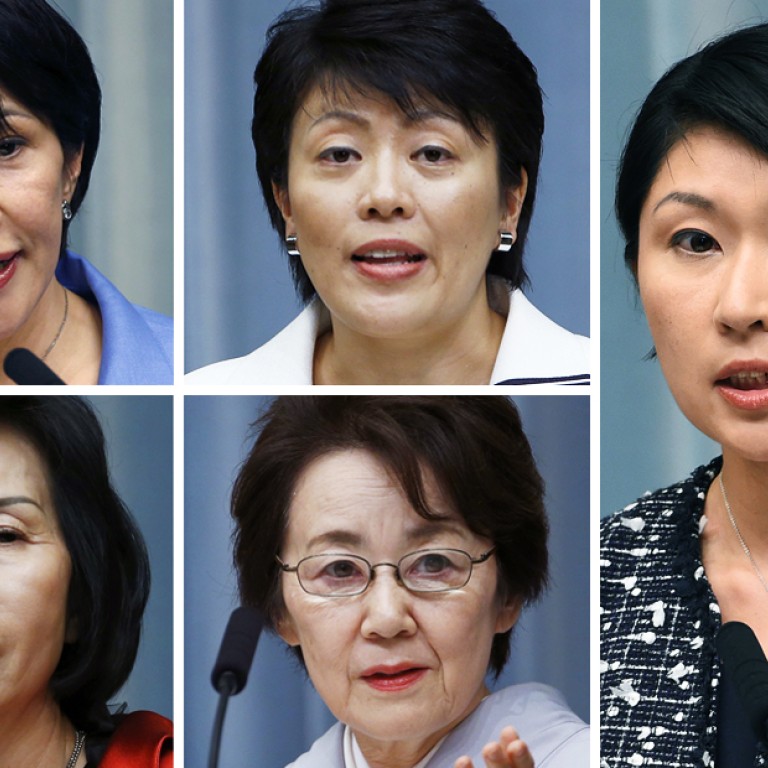
Update | Japan names five women to new cabinet of Prime Minister Shinzo Abe
A main plank in the government's economic plans, know as 'Abenomics', is a far greater involvement of women at all business levels
Five women were chosen for Shinzo Abe's cabinet yesterday, matching the past record and sending the strongest message yet about his determination to revive the economy by attracting women as workers and leaders.
The nation has a vast pool of talented, well-educated women, but they are far under-represented in positions of power in government and business, making up 10 per cent of parliament and just 3.9 per cent of board members of listed Japanese companies. Women in Japan have long complained about obstacles at work, getting equal pay for equal work and finding child-care or helpful spouses.
As a woman, I am happy to have even one additional woman in power
Abe has said that a key part of his "Abenomics" growth strategy is making greater use of women and promoting them to leadership posts and has set a goal of having women in 30 per cent of leadership positions in both the private and public sectors by 2020.
Having five women in the 18-member cabinet is extremely rare for Japan, It matches the highest number, set back in 2001, under Junichiro Koizumi. Abe's previous cabinet, which was dissolved earlier in the day, had two women ministers.
Although holding ministerial positions is in some ways ceremonial in Japan, where government affairs are largely run by professional bureaucrats, expanding the presence of women in a place as high-profile as the cabinet is a step towards sexual equality in Japan.
"As a woman, I am happy to have even one additional woman in power. There doesn't have to be a reason. I am rooting for them," said Kazuko Watanabe, who works as a public relations specialist in the port city of Yokohama, near Tokyo. "I hope they do their best to get the job done."
Yuko Obuchi, daughter of a former prime minister, was named trade and economy minister, probably the most prominent post, and Midori Matsushima was appointed justice minister.
Abe risked offending the long line of powerful men in his ruling party, who had been waiting to gain promotions.
While some experts say upsetting male colleagues could weaken Abe's grip on power, others said he may strengthen his position by inspiring women, who are highly active in party politics in Japan at the voter level even if generally they don't hold senior positions.
Several top ministers were retained, such as Fumio Kishida as foreign minister and Taro Aso as finance minister, both men.
In the United States, President Barack Obama has three women in cabinet positions, and has appointed women to other powerful positions such as the head of the Federal Reserve Board and Supreme Court justice. In France, women make up about half the ministerial posts.
The Geneva-based World Economic Forum ranked Japan 105th in last year's Global Gender Gap Report, which measures economic equality and political participation.
Iceland was top, followed by the Scandinavian nations. Germany was 14th and the US 23rd.
Traditional and modern culture in Japan tends to encourage the stereotype of the docile, cutesy girl as the ideal for womanhood, and Japanese politicians have been prone to sexist gaffes.
Earlier this year, a Tokyo city assemblyman apologised for heckling a woman assembly member who was making a speech about infertility and marriage. The other assembly members had joined in the taunting and laughter, and the apology came only after an outburst of sympathy on social networks and TV news shows.
Other women appointed by Abe include Sanae Takaichi as minister of internal affairs and communications and Eriko Yamatani as minister in charge of Japanese abducted by North Korea, an area in which she has been active. Haruko Arimura was chosen to be minister in charge of promoting women. All five are legislators.
Satomi Moroda, who heads the Women and Work Research Centre in Tokyo, a non-profit group, said society's consciousness must evolve from the mindset that the primary roles of women were that of wife and mother, while the man's role was to work outside the home, but such ideas were deeply entrenched.
"The appointments of women mark progress," she said. "We must first start with numbers, or things won't move forward."
Japan next week will host the World Assembly for Women, with participants including IMF managing director Christine Lagarde.
